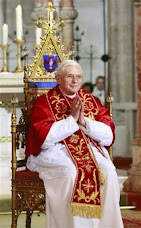Discernment is a process of clarifying that which is unclear or revealing that which is hidden. It typically requires great attention to detail.
For example, when a friend passes you a note and their penmanship is awful, you have to discern what it was that he wrote.
Question: Why, if God has a call for us, is it unclear or "hidden"? Why not just drop us a letter in the mail that reads,
"Dear Child, made in my own image, I call you to be a _________. Please amend your life accordingly.
Your (Almighty) Creator, God."
Answer: It is NOT that God wants you to suffer in confusion or darkness. Rather, God respects one of the characteristics with which he endowed each of us - Free Will. God wills that we desire to first of all discover our vocation, and then that we pursue it.
Helpful Tools in the Discernment Process:
Prayer - which is, of course, a conversation with God. In discerning God's will it is particularly important that we emphasize our listening role within that conversation. Reading scripture, attending Church, and participating in various devotions with an open heart and mind are good ways to "listen" to God.
God does not speak to us using a loud, booming voice. Instead it is a quiet, subtle voice, which requires us to make an effort to hear it. Consider this: In your car you probably have a radio with a number of pre-set station buttons. When you turn on the radio you do not hear all of these stations at the same time. You have to be "tuned in" to the right station (and therefore tune out the others).
Likewise, listening to God requires that we "tune out" many of the other voices in our lives in order to hear the voice of God. Consider some of the "pre-sets" that are always on your "life radio": 1. Television 2. Music 3. Friends 4. Parents & Siblings
All of these are telling us, directly or indirectly, what to think, what to do, even what to wear. Discernment is about tuning out many of those other voices and tuning in God's - maybe even putting him as your number 1 preset.
Other Tools:
2. Experts - if you want to know more about a given vocation, it only makes sense that you would talk to someone who is currently living that vocation. You can gain invaluable insight from those who have been down the road upon which we are about to embark.
3. Reading - we may not have many living experts within the circle of people we know. However, the biographies and journals of these people are only as far away as the library or a bookstore. (Many such resources are even available on the internet.)
4. Outward Focus - President John F. Kennedy encouraged citizens with the oft-quoted phrase, "Ask not what your country can do for you, but what you can do for your country." This is the essence of an outward focus. Look at your community, or even the world at large, and ask yourself, "what does the world need from me?" This can open our eyes to things we never imagined as vocations.
5. Self-Knowledge - Discerning a vocation is pointless if we do not know who it is (ourselves) that God is calling. This means knowing our strengths, weaknesses, passions,
Subscribe to:
Post Comments (Atom)



No comments:
Post a Comment